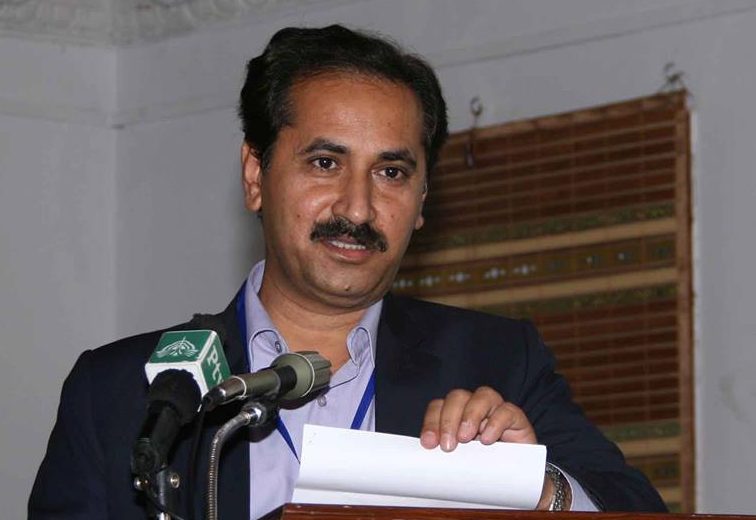
(Nasir Abbas Nayyar)
Rainer Maria Rilke, the great German poet writes in The Notes of Malte Laurrids Brigg (1910):
‘‘There is a creature that is completely harmless for your eyes: you scarcely notice it and forget it immediately. But as soon as, invisibly, it somehow gets into your ear, it develops there and, as it were, finally comes out of its cocoon; and there have been cases in which it penetrated to the brain and there spread devastation, somehow like the pneumococci of the dog which enter through the node.’’
Rilke calls this creature ‘the neighbour’ but it qualifies well to be termed ‘fear of war’. Your eyes come across some small unusual news item appearing in newspapers or on TV; you scarcely notice its gravity and forget it immediately; you deduce it’s quite harmless. But as it keeps appearing over and over again, you find it penetrating your brain. Soon the moment comes when you hit upon its severity; you are shattered by the ‘fear of war’.
What is fear of war? It begins metamorphosing almost everything we come across: minor things turn into the gigantic ones; the ‘peripheral’ appear to clutch the central place; everything seems to be perpetrating horribly monstrous things.
Where does the fear of war end? A fearful person becomes terribly conscious of the very question of his or her existence — a question that never finds room in the narratives of wars repeatedly appearing on the media. The question of existence is distinct from the problem of living. Living is akin to walking on a safe road, but for existence the metaphor of ‘lost in jungle’ is better. Walking safely on a road makes us forget the dangers that lie ahead or the ones that may erupt during a philosophical enquiry. Being lost in the jungle brings us dreadfully to the very heart of the question of the meaning of existence. You have a lot of options at your disposal while strolling on a road: you can run, dawdle or choose to sit on side or go back. But jungle allows you minimal choices. You yourself have to create choices and cut ways to come out of jungle. You have to cease wishing for some unexpected help. You have to dive deep into your very self. You have no other way except making some great decisions about your total survival.
The fear of war doesn’t only put your life at stake; it endangers your very right to exist; it jeopardises the basic right to thinking about the meaning of existence. The fear of war exceeds the panic of imminent death.
The fear of war compels you to look at the issue of total survival. And here arises a paradox. Total survival demands vertically deep and immeasurable consciousness but the consciousness ensuing from the fear of war tends to be immersed into a kind of illness. You are fully conscious — but are conscious of the depressed and miserable conditions your existence wrapped in.
We know that consciousness has always been about some object. In the fear of war, we ‘ourselves’ become the object of our own consciousness. And here one more paradox comes to the fore. Consciousness and object remain at a distance. There must be something available to prevail over the distance. The spectre of fear of war keeps strolling between ‘object’ and ‘consciousnesses’ mutating consciousness into illness. Dostoevsky has grasped the said paradox in his novel Notes from Underground. The following lines, a kind of confessional statement by a character, describe precisely the above mentioned paradox:
‘’I want now to tell you, gentlemen, whether you care to hear or not, why I couldn’t become an insect. I tell you solemnly, that I have many times tried to become an insect. But I was not equal even to that. I swear, gentlemen, that to be too conscious is an illness …a real thoroughgoing illness.’’
The insect symbolises the lowest and the worst state of being. Human beings have been struggling against the conditions that can metamorphose them into insects. In Intizar Hussain’s The Last Man, the protagonist strives till the end against becoming a monkey. He struggles against the fear of yielding to the worst end. Though he fails but his resistance remains strong.
Struggle against the fear of war and its spectre is essentially against the perpetrators of them. Fear is produced and built the way weapons of war are built. It is sold like military equipment. The fear of war is probably the most disastrous weapon because it hits people on your own land and enemy land equally. Some wars were won without fighting on ground or in air when the weapon of fear was used precisely.
It is a common observation that while civil and military leaders combat the fear of war by proclaiming arsenal strength dovetailed with unbeatable patriotism, writers ponder over the essential issues of existence that arise out of fear. Civil and military leaders devise a strategy to combine the power of arsenal with the power of words. To be sure, ‘unbeatable patriotism’ is the play of the power of words: efficacy of this play works only when existential side of fear of war is sidelined.
Tactically, ‘patriotic writers’ are made to outshine writers who seek to address the existential issues of the fear of war.
Historically speaking, we find a good number of writers who have been following the path of their leaders by producing encomia in praise of the ideology of nation devised and held by the rulers. (A commonplace distinction between the love for land and adorable affectation for nation should be recalled; the first is natural while the second is socially and politically constructed.)
Contrary to the popular narrative about writers that they as a community are disgusted by battles, we find in ancient, classical and even modern periods a brand of writers and intellectuals who don’t hesitate to support and eulogise power, often also participating in games of power. A popular aphorism says that pen is more powerful than sword. (But whose pen? A military leader’s or ruler’s pen possesses and exercises a power huger and more real than that of the writer.)
Of course, words have power of their own kind. Initially the power of words was discovered by magicians of mythical periods. They came to believe through experience that the recitation of versified texts provoked some supreme power(s) to materialise what the texts intended. National, heroic, patriotic songs sung and played during wars seem to emulate the technique of magicians.
Pre-Islam Arab poets were part of the wars fought between their tribes. They eulogised the fearless deeds of their tribal war heroes. Muhammad Kazim is of the view that “[Jahiliya Arab] poet used to serve his tribe quite like modern day newspapers, radio, TV and public relation departments of a country’’. In modern periods tribal affinity has been taken over by national brethren. But a subtle difference must be noted. Tribal affinity was natural and to some extent instinctual, but national brotherhood is an invention, a contrivance that concurs with the advancing of ‘public sphere’.
Not surprisingly the books, film, drama and media that create and hold ‘publics sphere’ have become modern fields of wars. These modern fields of wars have acquired an undying role. A war of narratives is being waged all the time, between nations, sects and different ethnic groups. They have to remain active in times of ‘peace’ and hyperactive during wars being fought on real grounds. Fear of war erupts from the hyperactivity of ‘public sphere’.
The writers who choose to become part of the war by singing national and patriotic songs suggest that thinking in terms of right and wrong have boundaries that are clear and beyond doubt. But existential writers appear to be thinking within the grey areas of right and wrong, the area less treaded by media, and even by traditional literature and philosophy.
A fearless imagination and dynamic intellect are required to perceive the existentialist questions inhabiting that grey area. Existentialist questions are quite informal, erupting out of individualised situations and taking distinctive form. You yourself have to form your own, authentic self by forming your own questions and making your own decisions. Your decision is destiny. A choice between whether we’ll be overwhelmed by fear or will we overwhelm the fear?
Existentialist writers are not scared of exploring ways and limits of how weird things can affect human psyche. Here lies the answer to a question that has often been raised in academia and literary criticism about why most of world classics were written out of wars, in one or the other way. Whether they be Greek (Odyssey), Persian (Shahnama of Firdosi), Sanskrit (Mahabharta), Russian (War and Peace), English (Farewell to Arms, Birdsong) or Urdu (Aag ka Darya, Udas Naslain) to mention a few. It needs to be stressed that literature written out of war usually depicts absurdity and meaninglessness.
War brings only wreck and ruin which existentialist writers construe as absolutely absurd. Sartre’s existentialism is an attempt to draw a concept of political commitment out of the absurdity wreaked by the mass destruction of the Second World War. But the existential side of fear of war is inundated with fighting against the very conditions of reducing our being to insect, and throwing us into the abyss of absurdity.
By fighting against the spectre of fear, we assert our right and ability to create an environment of peace without which we can’t make our life liveable and our death worth dying. Nietzsche says “Die the right time. Of course, how could those who never live at the right time die at the right time’’.
Living and dying at the right time becomes possible only when we dare to “find a chasm of peace into the conjugation of notches surrounded by killer jaws” as described by Majeed Amjid in one of his poems written just before the 1971 war.
(Courtesy: The News on Sunday, on October 9, 2016)


